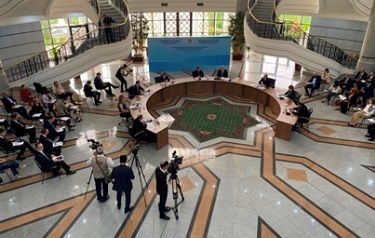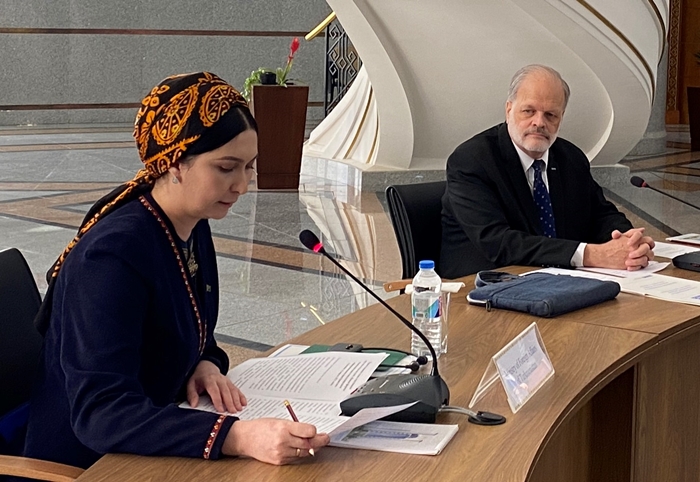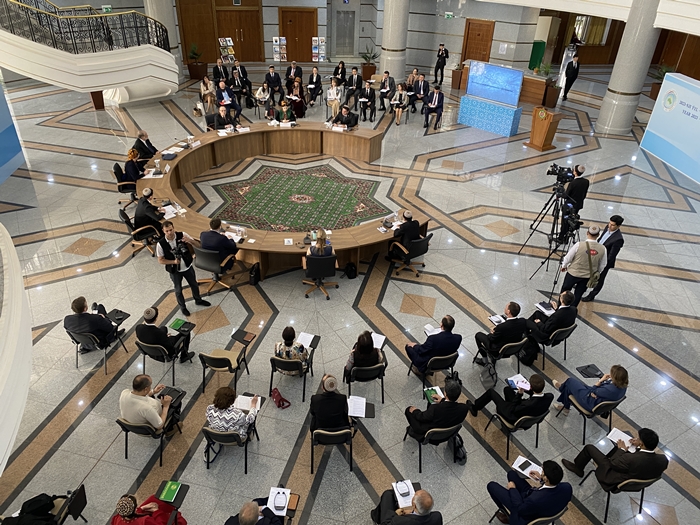nCa Report
It was stepping into the uncharted territory, literally. — The media roundtable hosted jointly by the foreign office of Turkmenistan and the OSCE Centre in Ashgabat on 14 April 2023 was a unique and unprecedented event.
The theme of the roundtable was – “New formats of cooperation in the international information environment.”
It was not the kind of event we can just report and leave in the yesterdays’ news cycle. The idea is here to stay.
This is the first part of our four-part series. In this part we will build a trio of contexts in the hope of creating a serviceable template for reporting the future events of this kind.
In the second and third part of the series we will present a summarized report of the proceedings of the roundtable and analyse some related points.
The last part of the series would be an opinion piece.
* * *
The first context: This roundtable was the start of a dialogue – All of the dialogue partners were not on the table simply because we still don’t know who those partners could or would be. The logical aspiration is that the dialogue initiated last Friday would evolve into a narrative that is dynamic in nature. For this initiative to be of practical and continuing use, it must act like a living organism.
* * *
The second context, connecting with the first at the top, is the role of OSCE in Ashgabat.
nCa had a short conversation with Ambassador John MacGregor, the head of the OSCE Centre in Ashgabat, just before the start of the roundtable.
He said, “This kind of event is to get us working together better and talking better. Because one of the issues we have is that we sometimes talk around each other, we are not clear with each other, but we are trying to.”
Speaking of the AI, he said the people are relying on it to assist them but its use can also be problematic. He mentioned the example of a recent AI-generated picture of an ex-president of the USA that caused sensation around the world before being exposed as fake.
“How do we help people decide what is real and what is not. And this a really big question and we need to start to deal with it,” he said.
When asked whether, in his opinion, the public and private media in Turkmenistan was ready to absorb AI, Ambassador MacGregor said, “I really don’t think any news media anywhere in the world is really ready for it.”
“And, this causes a lot of concern in OSCE because we need to do more, not just here in Turkmenistan but globally, and if we don’t, the society is going to have some difficult times ahead,” he said.
The OSCE ambassador made two points here: 1. The AI, used wrongly or irresponsibly, can be problematic for the producers and consumers of information and content; and, 2. The news media worldwide is still not ready to absorb the AI in any significant way.
These are pertinent points.
As far his second point is concerned, the chatbots and AI only started drawing the mass attention in November 2022, when ChatGPT made its debut. It has only been less than five months since then.
The first point about the use of AI for the generation and distribution of fake or misleading information in any format – text, audio, video, infographics etc. – is what actually concerns us here.
The AI is at the outer edge of the media landscape. By setting sight on it, we are automatically taking into account all the other forms and methods of fake information that exist so far.
What we need to keep in mind is that as we learn more about AI, the AI would also be learning more about us.
* * *
The third context, connecting with the first two at the top, is the vision of Turkmenistan – what does Turkmenistan expect from this exercise?
Ms. Mahri Bashimova, the deputy minister of foreign affairs of Turkmenistan, spelled it out quite clearly in her welcoming remarks.
“The Government of Turkmenistan sets priority tasks for the domestic media sphere. Today, there is a need for more active promotion in the global digital space of up-to-date and reliable information about Turkmenistan, news reports on the transformations and achievements taking place in the country, studying the best world experience, the emergence of new formats and standards of broadcasting, print, and electronic press,” she said.
Bashimova highlighted the need for the further improvement and stimulation of the activities of private media in Turkmenistan.
She mentioned some areas of concern such as the illegal use of information technology, the implantation from the outside of ideas and attitudes that run counter to the historical traditions of the peoples of Central Asia and the basic values and centuries-old foundations of their life.
The deputy minister said that joint efforts should be made to keep Central Asia a zone of stability and trust, not subject to risks for peace and development.
She proposed the holding of a Central Asian media forum dedicated to security issues with the participation of state news agencies, print media, and electronic media.
* * *
The roundtable, in search of new formats for Turkmenistan to cooperate in the international information environment, touched on two areas: 1. Media literacy (with focus on fake news); and 2.Information policy (with focus on social media).
These are two very important areas but they don’t constitute the entire landscape of new format for cooperation.
Let us weld the three contexts presented here and come up with a clear statement: We can say that in search of new formats of cooperation between Turkmenistan and the international information environment, a dialogue has started that will certainly evolve into a dynamic narrative, the OSCE in Ashgabat has an important role to play in this process, and the objective will always be to meet the expectations Turkmenistan attaches to the entire process. /// nCa, 17 Apr. 23
To be continued . . .


